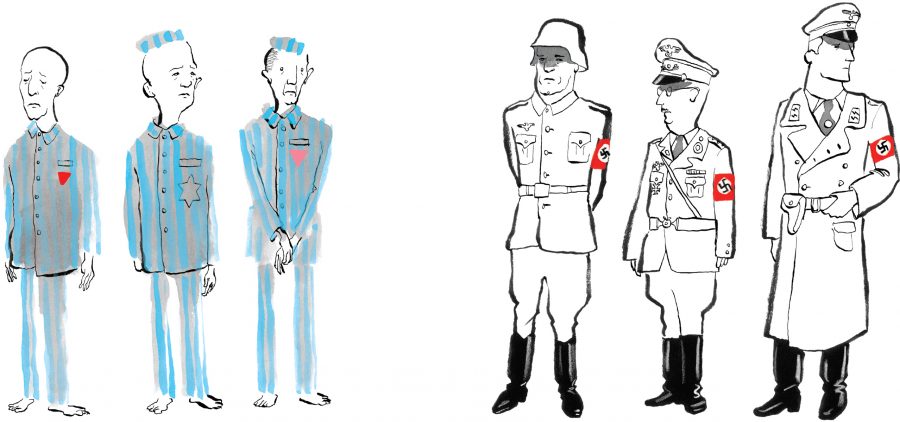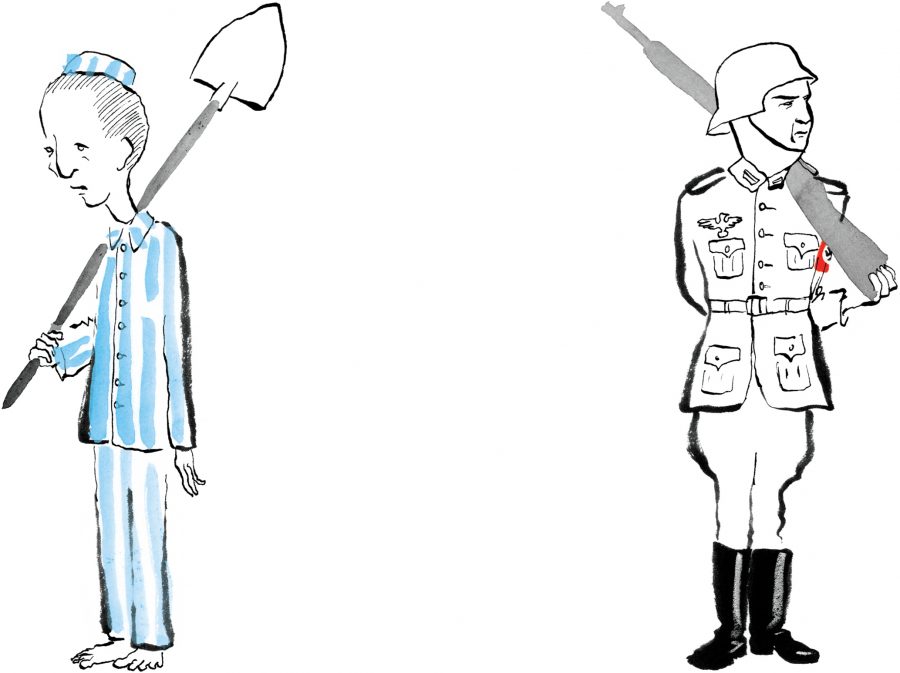
Nothing changed for quite a while at Out-With.
Bruno still had to put up with Gretel being less than friendly to him whenever she was in a bad mood, which was more often than not because she was a Hopeless Case.
And he still wished that he could go back home to Berlin, although the memories of that place were beginning to fade and, while he did mean to, it had been several weeks since he had even thought about sending another letter to Grandfather or Grandmother, let alone actually sitting down and writing one.
The soldiers still came and went every day of the week, holding meetings in Father’s office, which was still Out Of Bounds At All Times And No Exceptions. Lieutenant Kotler still strode around in his black boots as if there was no one in the whole world of any more importance than him, and when he wasn’t with Father he was standing in the driveway talking to Gretel while she laughed hysterically and twirled her hair around her fingers, or whispering alone in rooms with Mother.
The servants still came and washed things and swept things and cooked things and cleaned things and served things and took things away and kept their mouths shut unless they were spoken to. Maria still spent most of her time tidying things away and making sure that any item of clothing not currently being worn by Bruno was neatly folded in his wardrobe. And Pavel still arrived at the house every afternoon to peel the potatoes and the carrots and then put his white jacket on and serve at the dinner table. (From time to time Bruno saw him throw a glance in the direction of his knee, where a tiny scar from his swing-related accident was in evidence, but other than that they never spoke to each other.)
But then things changed. Father decided it was time for the children to return to their studies, and although it seemed ridiculous to Bruno that school should take place when there were only two students to teach, both Mother and Father agreed that a tutor should come to the house every day and fill their mornings and afternoons with lessons. A few mornings later a man called Herr Liszt rattled up the driveway on his boneshaker and it was time for school again. Herr Liszt was a mystery to Bruno. Although he was friendly enough most of the time, never raising his hand to him like his old teacher in Berlin had done, something in his eyes made Bruno feel there was an anger inside him just waiting to get out.
Herr Liszt was particularly fond of history and geography, while Bruno preferred reading and art.
‘Those things are useless to you,’ insisted the teacher. ‘A sound understanding of the social sciences is far more important in this day and age.’
‘Grandmother always let us perform in plays back in Berlin,’ Bruno pointed out.
‘Your grandmother was not your teacher though, was she?’ asked Herr Liszt. ‘She was your grandmother. And here I am your teacher, so you will study the things that I say are important and not just the things you like yourself.’
‘But aren’t books important?’ asked Bruno.
‘Books about things that matter in the world, of course,’ explained Herr Liszt. ‘But not storybooks. Not books about things that never happened. How much do you know of your history anyway, young man?’ (To his credit, Herr Liszt referred to Bruno as ‘young man’, like Pavel and unlike Lieutenant Kotler.)
‘Well, I know I was born on April the fifteenth nineteen thirty-four—’ said Bruno.
‘Not your history,’ interrupted Herr Liszt. ‘Not your own personal history. I mean the history of who you are, where you come from. Your family’s heritage. The Fatherland.’
Bruno frowned and considered it. He wasn’t entirely sure that Father had any land, because although the house in Berlin was a large and comfortable house, there wasn’t very much garden space around it. And he was old enough to know that Out-With did not belong to them, despite all the land there. ‘Not very much,’ he admitted finally. ‘Although I know quite a bit about the Middle Ages. I like stories about knights and adventures and exploring.’
Herr Liszt made a hissing sound through his teeth and shook his head angrily. ‘Then this is what I am here to change,’ he said in a sinister voice. ‘To get your head out of your storybooks and teach you more about where you come from. About the great wrongs that have been done to you.’
Bruno nodded and felt quite pleased by this as he assumed that he would finally be given an explanation for why they had all been forced to leave their comfortable home and come to this terrible place, which must have been the greatest wrong ever committed to him in his short life.
Sitting alone in his room a few days later, Bruno started thinking about all the things he liked to do at home that he hadn’t been able to do since he had come to Out-With. Most of them came about because he no longer had any friends to play with, and it wasn’t as if Gretel would ever play with him. But there was one thing that he was able to do on his own and that he had done all the time back in Berlin, and that was exploring.
‘When I was a child,’ Bruno said to himself, ‘I used to enjoy exploring. And that was in Berlin, where I knew everywhere and could find anything I wanted with a blindfold on. I’ve never really done any exploring here. Perhaps it’s time to start.’
And then, before he could change his mind, Bruno jumped off his bed and rummaged in his wardrobe for an overcoat and an old pair of boots – the kind of clothes he thought a real explorer might wear – and prepared to leave the house.
There was no point doing any exploring inside. After all, this wasn’t like the house in Berlin, which he could just about remember had hundreds of nooks and crannies, and strange little rooms, not to mention five floors if you counted the basement and the little room at the top with the window he needed to stand on tiptoes to see through. No, this was a terrible house for exploration. If there was any to be done it would have to be done outside.
For months now Bruno had been looking out of his bedroom window at the garden and the bench with the plaque on it, the tall fence and the wooden telegraph poles and all the other things he had written to Grandmother about in his most recent letter. And as often as he had watched the people, all the different kinds of people in their striped pajamas, it had never really occurred to him to wonder what it was all about.

It was as if it were another city entirely, the people all living and working together side by side with the house where he lived. And were they really so different? All the people in the camp wore the same clothes, those pajamas and their striped cloth caps too; and all the people who wandered through his house (with the exception of Mother, Gretel and him) wore uniforms of varying quality and decoration and caps and helmets with bright red-and-black armbands and carried guns and always looked terribly stern, as if it was all very important really and no one should think otherwise.

What exactly was the difference? he wondered to himself. And who decided which people wore the striped pajamas and which people wore the uniforms?
<!–

–>
Of course sometimes the two groups mixed. He’d often seen the people from his side of the fence on the other side of the fence, and when he watched it was clear that they were in charge. The pajama people all jumped to attention whenever the soldiers approached and sometimes they fell to the ground and sometimes they didn’t even get up and had to be carried away instead.
It’s funny that I’ve never wondered about those people, Bruno thought. And it’s funny that when you think of all the times the soldiers go over there – and he had even seen Father go over there on many occasions – that none of them had ever been invited back to the house.
Sometimes – not very often, but sometimes – a few of the soldiers stayed to dinner, and when they did a lot of frothy drinks were served and the moment Gretel and Bruno had put the last forkful of food in their mouths they were sent away to their rooms and then there was a lot of noise downstairs and some terrible singing too. Father and Mother obviously enjoyed the company of the soldiers – Bruno could tell that. But they’d never once invited any of the striped pajama people to dinner.
Leaving the house, Bruno went round the back and looked up towards his own bedroom window which, from down here, did not look quite so high any more. You could probably jump out of it and not do too much damage to yourself, he considered, although he couldn’t imagine the circumstances in which he would try such an idiotic thing. Perhaps if the house were on fire and he was trapped in there, but even then it would seem risky.
He looked as far to his right as he could see, and the tall fence seemed to carry on in the sunlight and he was glad that it did because it meant that he didn’t know what was up ahead and he could walk and find out and that was what exploration was all about after all. (There was one good thing that Herr Liszt had taught him about in their history lessons: men like Christopher Columbus and Amerigo Vespucci; men with such adventurous stories and interesting lives that it only confirmed in Bruno’s mind that he wanted to be like them when he grew up.)
Before heading off in that direction, though, there was one final thing to investigate and that was the bench. All these months he’d been looking at it and staring at the plaque from a distance and calling it ‘the bench with the plaque’, but he still had no idea what it said. Looking left and right to make sure that no one was coming, he ran over to it and squinted as he read the words. It was only a small bronze plaque and Bruno read it quietly to himself.
‘Presented on the occasion of the opening of…’ He hesitated. ‘Out-With Camp,’ he continued, stumbling over the name as usual. ‘June nineteen forty.’
He reached out and touched it for a moment, and the bronze was very cold so he pulled his fingers away before taking a deep breath and beginning his journey. The one thing Bruno tried not to think about was that he had been told on countless occasions by both Mother and Father that he was not allowed to walk in this direction, that he was not allowed anywhere near the fence or the camp, and most particularly that exploration was banned at Out-With.
With No Exceptions.